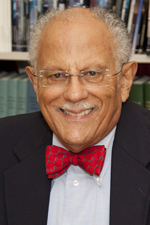Biography

Warren Morton Washington was born in 1936 in Portland, Oregon, where he and his four brothers were raised by their father, a railroad worker, and mother, a nurse. Washington's love of science began to flourish in high school, thanks in part to a chemistry teacher who encouraged students to conduct independent research. During his high school years, Washington worked as a dishwasher and janitor at the local Good Samaritan Hospital. His connections at work led him to attend Oregon State College (OSC) while finding similar employment at the Corvallis Good Samaritan Hospital.
Washington graduated from Jefferson High School in 1954 and move to OSC that fall. During his freshman year, he lived in the Reed Cooperative to save money, and during the summers he held a variety of odd jobs, including a stint repossessing cars. He graduated from OSC in 1958 with a B.S. in Physics.
Washington spent the summer after his graduation at the Stanford Research Institute working with Dr. Manfred Holl on an objective analysis of meteorological fields. This experience prompted him to continue his studies at Oregon State, where he shifted his focus to meteorology, as explored in the school's General Science master's program. While a graduate student, Washington also operated a weather radar apparatus located at the top of Marys Peak.
In 1960 Washington received his M.S. in General Science from Oregon State. He then moved on to Pennsylvania State University to begin doctoral research on objective analysis and numerical weather prediction. In 1963 he moved to Boulder, Colorado, where he had accepted an appointment at the newly created National Center for Atmospheric Research (NCAR). He formally received his Ph.D. in Meteorology in 1964 and in the process became only the second African American in history to earn a doctorate in the atmospheric sciences. In the years that followed, Washington became an important advocate and mentor for a broad diversity of young researchers in the atmospheric sciences and has been particularly active with the SOARS (Significant Opportunities in Atmospheric Research and Science) program, sponsored by the University Corporation for Atmospheric Research.
Washington's early assignment at NCAR was as a Senior Scientist, working on numerical prediction and computer simulation of the Earth's climate. In the mid-1960s, his research group became the first to simulate Indian-Asian Monsoons. In the 1970s, NCAR's focus shifted to climate modeling, particularly with respect to oceans and sea ice, and Washington was a member of the center's Community Climate Model Steering Committee from 1974-1987. He also served as the principal investigator for a Department of Energy contract that resulted in NCAR's first models tracking concentrations of carbon dioxide in the atmosphere.
In the 1970s, Washington began working on the National Research Council, coordinating federal research on topics of global change, and in 1975 and was appointed by President Jimmy Carter to the National Advisory Committee for Oceans and Atmosphere. He has since advised every presidential administration from Jimmy Carter to Barack Obama. In 1984 he co-wrote An Introduction to Three Dimensional Modeling with Claire Parkinson, and from 1986-1995 he was featured as one of sixteen scientists in a Chicago Museum of Science and Industry exhibit titled "Black Achievers in Science." In 1990 Washington became a member of the Secretary of Energy's Biological and Environmental Research Advisory Committee, and from 1994 to 2006 he held a presidential appointment on the National Science Board.
During his career, Washington has been active in multiple professional groups. He began his involvement with the American Association for the Advancement of Sciences in 1969 and has been associated with the American Meteorological Society (AMS) since 1976. Washington was elected president of the AMS in 1993 and, in 2006, he received the organization's most prestigious distinction when he named an Honorary Member.
Indeed, Washington has been highly decorated for his achievements in science. In 1995 he received the Le Verrier Medal from the Societe Meteorologique de France and, in 1996, the Distinguished Alumni Award from OSU, echoing a similar award granted by Pennsylvania State University in 1991. He has received honorary doctorates from OSU (2006) and the University of Massachusetts (2013) and, in November 2010, President Obama awarded Washington the National Medal of Science for "his fundamental contributions to the understanding of Earth's coupled climate system through numerical simulation, leadership in U.S. science policy, and inspiring mentorship of young people of all backgrounds and origins." The following year Washington received a lifetime appointment to the National Academy of Sciences.
Perhaps Washington's crowning achievement came in 2007, when the Nobel Peace Prize was awarded to the Intergovernmental Panel on Climate Change, an organization that relied heavily on decades of work conducted by Washington and his colleagues at the National Center for Atmospheric Research. In the opinion of the Nobel committee, the Intergovernmental Panel and its constituents, which included more than three dozen NCAR scientists and support staff, "created an ever-broader informed consensus about the connection between human activities and global warming."

